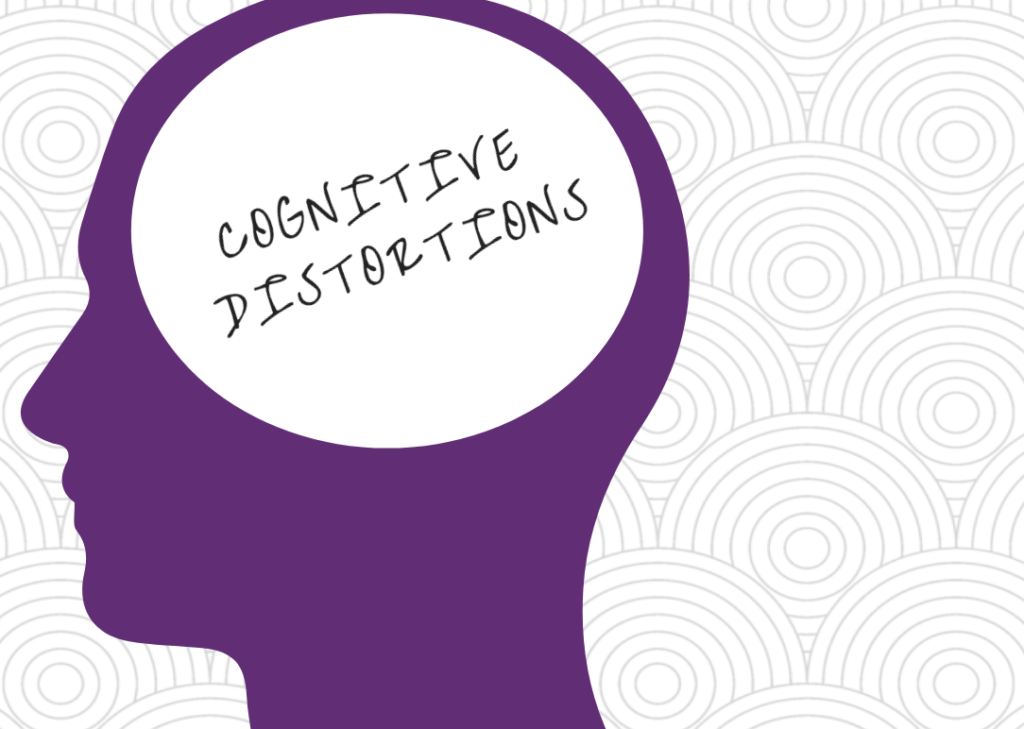Contents
- 1 What Are Cognitive Distortions?
- 2 17 Cognitive Distortions
- 2.1 1. All-or-nothing thinking
- 2.2 2. Overgeneralization
- 2.3 3. Mental filter
- 2.4 4. Labeling and mislabeling
- 2.5 5. Negative self-talk
- 2.6 6. Magnification and minimization
- 2.7 7. Catastrophizing
- 2.8 8. Selective abstraction
- 2.9 9. Emotional reasoning
- 2.10 10. Thought-action fusion
- 2.11 11. Perfectionism
- 2.12 12. Overgeneralization
- 2.13 13. Dichotomous thinking
- 2.14 14. Labeling and mislabeling
- 2.15 15. Disqualifying the positive
- 2.16 16. Emotional reasoning
- 2.17 17. Thought-action fusion
- 3 How Cognitive Distortion Affects Life?
- 4 How To Stop Cognitive Distortion?
- 5 Tips To Prevent Cognitive Distortions In The First Place
- 6 Conclusion
- 7 A Word From Therapy Mantra
What Are Cognitive Distortions?
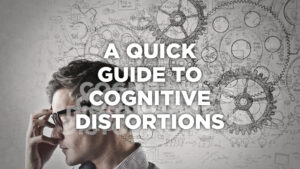
Cognitive distortions are negative thoughts that we often experience on a daily basis. These thoughts can be about ourselves, others, or the world around us. They can cause us to feel depressed, anxious, and have other mental health issues.
Cognitive distortions can negatively affect our daily lives. We all have negative thoughts from time to time, but when these thoughts become too frequent or intense, they can lead to cognitive distortions. These distortions can cause us to see ourselves, others, and the world around us in a negative light, which can lead to feelings of depression, anxiety, and other mental health issues.
17 Cognitive Distortions
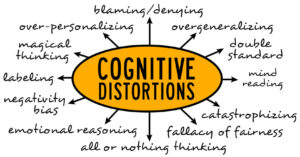
There are many different types of cognitive distortions, but some of the most common ones include:
1. All-or-nothing thinking
All-or-nothing thinking is a type of cognitive distortion that involves seeing everything in black-and-white terms. We see everything as either good or bad, and we ignore the many shades of gray in between. This can lead to a lot of negative thoughts and emotions, such as depression and anxiety.
2. Overgeneralization
Overgeneralization is another type of cognitive distortion that involves seeing one negative event as a never-ending pattern. For example, if you get rejected from a job interview, you may start to think that you’re not good enough for anything. This can be very damaging to our self-esteem and can lead to feelings of depression and anxiety.
3. Mental filter
A mental filter is a type of cognitive distortion that involves focusing on the negative aspects of a situation while ignoring the positive ones. For example, if you get a bad grade on a test, you may focus on that one bad score and ignore all of the other good grades you got. This can lead to feelings of discouragement and low self-esteem.
4. Labeling and mislabeling
Labeling and mislabeling is a type of cognitive distortion that involves attributing permanent and negative characteristics to ourselves or others based on a single event or action. For example, if you get into a fight with your partner, you may start to call yourself an “angry person” or your partner may start to call you a “bad person.” This can be very damaging to our relationships and can lead to feelings of guilt and shame.
5. Negative self-talk
Negative self-talk is a type of cognitive distortion that involves internal dialogue that is critical and judgmental. For example, you may tell yourself that you’re not good enough or that you’ll never be able to do anything right. This type of self-talk can be very damaging to our confidence and self-esteem.
6. Magnification and minimization
Magnification and minimization is a type of cognitive distortion that involves exaggerating the importance of negative events or minimizing the importance of positive ones. For example, you may think that a single mistake is a sign that you’re a terrible person, or you may dismiss compliments as being meaningless. This can lead to feelings of insecurity and self-doubt.
7. Catastrophizing
Catastrophizing is a type of cognitive distortion that involves thinking the worst possible outcome will happen in any given situation. For example, if you forget to bring your laptop to a meeting, you may start to think that you’ll be fired from your job. This type of thinking can lead to a lot of anxiety and stress.
8. Selective abstraction
Selective abstraction is a type of cognitive distortion that involves focusing on one aspect of a situation while ignoring all of the other relevant information. For example, if you get into a fight with your partner, you may focus on the fact that they said something mean to you, but you’ll ignore all of the positive things they said as well. This can lead to distorted views of relationships and can cause a lot of conflicts.
9. Emotional reasoning
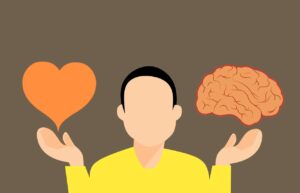
Emotional reasoning is a type of cognitive distortion that involves assuming that our emotions are always accurate reflections of reality. For example, if you feel like you’re not good enough for your job, you may start to believe that it’s true. This can lead to a lot of negative thoughts and feelings.
10. Thought-action fusion
Thought-action fusion is a type of cognitive distortion that involves thinking that our thoughts always lead to certain actions. For example, you may think that if you have a negative thought about someone, you’ll automatically want to hurt them. This can lead to a lot of fear and anxiety.
11. Perfectionism
Perfectionism is a type of cognitive distortion that involves setting unrealistically high standards for ourselves and then judging ourselves harshly when we fail to meet them. This can lead to a lot of stress and anxiety, and it can be very difficult to ever feel good enough.
12. Overgeneralization
Overgeneralization is a type of cognitive distortion that involves making sweeping generalizations based on a single event or experience. For example, if you get rejected by one person, you may start to believe that you’re not good enough for anyone. This can lead to feelings of loneliness and isolation.
13. Dichotomous thinking
Cognitive distortions can often lead to negative emotions such as depression, anxiety, and other mental health issues. They can also cause us to see the world around us in a very negative way. For example, if you see the world in terms of black and white, good and bad, you’re more likely to experience cognitive distortions. This type of thinking can be very unhelpful and can lead to a lot of conflict and stress.
14. Labeling and mislabeling
Labeling and mislabeling is a type of cognitive distortion that involves attaching labels to ourselves or others that are not based in reality. For example, you may call yourself a “failure” or “stupid person”, or you may call your partner a “jerk”. This type of thinking can be very damaging and can cause a lot of self-hatred.
15. Disqualifying the positive
Disqualifying the positive is a type of cognitive distortion that involves dismissing any good news or positive experiences as being irrelevant or untrue. For example, if you get a good review at work, you may dismiss it as being a fluke. This type of thinking can lead to a lot of negative thoughts and feelings.
16. Emotional reasoning
Emotional reasoning is a type of cognitive distortion that involves assuming that our emotions are always accurate reflections of reality. For example, if you feel like you’re not good enough for your job, you may start to believe that it’s true. This can lead to a lot of negative thoughts and feelings.
17. Thought-action fusion
Thought-action fusion is a type of cognitive distortion that involves thinking that our thoughts always lead to certain actions. For example, you may think that if you have a negative thought about someone, you’ll automatically want to hurt them. This can lead to a lot of fear and anxiety.
How Cognitive Distortion Affects Life?

Cognitive distortions can often lead to negative emotions such as depression, anxiety, and other mental health issues. They can also cause us to see the world around us in a very negative way. For example, if you see the world in terms of black and white, good and bad, you’re more likely to experience cognitive distortions. This type of thinking can be very unhelpful and can lead to a lot of conflict and stress.
Attaching Labels To Ourselves
Another way that cognitive distortion can affect our lives is by causing us to attach labels to ourselves or others that are not based on reality. For example, you may call yourself a “failure” or “stupid person”, or you may call your partner a “jerk”. This type of thinking can be very damaging and can cause a lot of self-hatred.
Doubting Our Own Thoughts
Cognitive distortion can also lead us to doubt our own thoughts and feelings. For example, if you feel like you’re not good enough for your job, you may start to doubt that feeling and wonder if it’s true. This can lead to a lot of anxiety and worry.
Assuming Negative Things
Finally, cognitive distortion can also lead us to assume that our emotions are always accurate reflections of reality. For example, if you feel like you’re not good enough for your job, you may start to believe that it’s true. This can lead to a lot of negative thoughts and feelings.
How To Stop Cognitive Distortion?
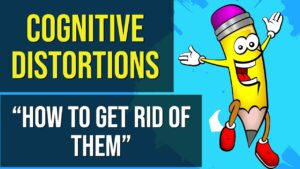
If you’re struggling with cognitive distortions, there are a few things that you can do to help stop them.
- First, it’s important to be aware of the different types of cognitive distortions. Once you know what they are, you can start to watch out for them.
- Second, you can practice challenging your thoughts. When you catch yourself thinking in a distorted way, question the validity of your thoughts and try to find evidence that supports them.
- Finally, it’s important to practice self-compassion. When you mess up or trip up on your cognitive distortions, be kind to yourself and forgive yourself. Remember that you’re human and you’re going to make mistakes.
Tips To Prevent Cognitive Distortions In The First Place

1. Be aware of the different types of cognitive distortions and what they look like. This will help you catch them when they happen.
2. Challenge your thoughts. When you catch yourself thinking in a distorted way, question the validity of your thoughts and try to find evidence that supports them.
3. Practice self-compassion. When you mess up or trip up on your cognitive distortions, be kind to yourself and forgive yourself. Remember that you’re human and you’re going to make mistakes.
4. Practice mindfulness. When you’re paying attention to the present moment, it’s much harder for cognitive distortions to take hold.
5. Find a therapist who can help you work through your cognitive distortions.
6. Read about cognitive distortion and how to overcome them. There are many helpful articles and books on this topic.
7. Talk to someone who understands what you’re going through. It can be helpful to talk to someone who understands cognitive distortions and how they can affect your life.
8. Join a support group or online forum for people who struggle with cognitive distortions. This can be a great way to connect with others who understand what you’re going through.
Conclusion
Cognitive distortions are inaccurate thoughts or ways of thinking that can lead to negative emotions and behaviors. Recognizing and understanding cognitive distortions is the first step in learning how to deal with them. In this article, we’ve highlighted some of the most common cognitive distortions and given you some tips for dealing with them. If you find yourself struggling with a certain distortion, be sure to reach out for help. There are many people who can support you in your journey towards healthy thinking.
A Word From Therapy Mantra
Your mental health — Your psychological, emotional, and social well-being — has an impact on every aspect of your life. Positive mental health essentially allows you to effectively deal with life’s everyday challenges.
At Therapy Mantra, we have a team of therapists who provide affordable online therapy to assist you with issues such as depression, anxiety, stress, workplace Issues, addiction, relationship, OCD, LGBTQ, and PTSD. You can book a free therapy or download our free Android or iOS app.
